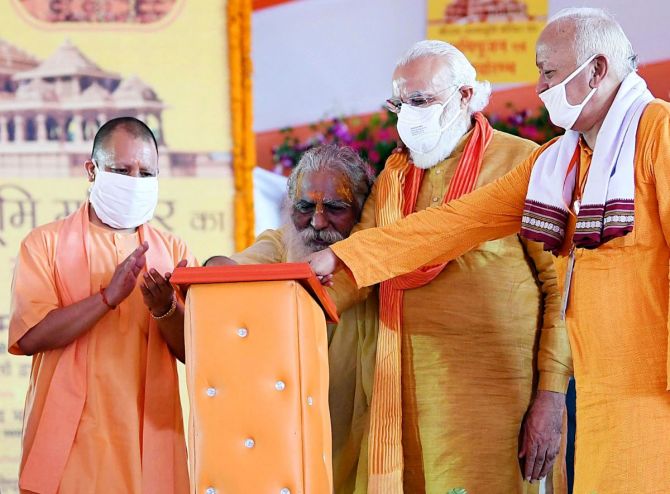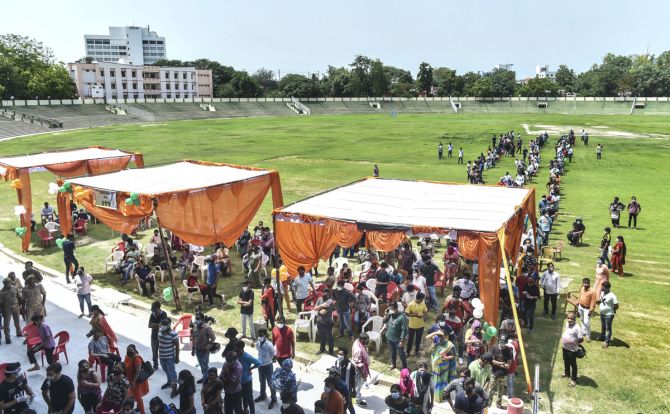 | « Back to article | Print this article |
'Mohan Bhagwat is very upfront with his views and arguments.'
'Mohan Bhagwat is competent to deal with Modi's personality cult.'

"The RSS is influencing the BJP's politics in a big way," says Badri Narayan, author of Republic of Hindutva - How the Sangh is Reshaping Indian Democracy.
Professor Narayan is a leading social scientist and anthropologist who has conducted extensive field research in Uttar Pradesh about how the Rashtriya Swayamsevak Sangh has become technologically savvy and has extended its influence amongst Dalits, tribals and marginalised communities to propagate Hindu nationalism to a larger section of people.
"It is very clear that the BJP is responding to the ideas of the Sangh through its politics in its second term," Professor Narayan tells Rediff.com's Archana Masih in part 1 of an interview.
You mention in your book that the RSS process of making a Hindutva public got ruptured by the outbreak of the pandemic.
How will the Modi government's handling of the pandemic affect the Sangh, which is the BJP's connect to grassroot support?
It will affect the BJP, and as a result, will also affect the Sangh.
The Sangh will be impacted because everybody at the moment is focused on saving himself/herself from COVID-19.
The Sangh's strength comes from social interactions among people, but the pandemic has halted that social connect.
It has restricted the movement and mobility of pracharaks. They cannot visit people's homes or hold sabhas like they are used to. Online shakhas do not have the connect of an actual shakha or assembly. That physical connect has been broken for the time being.
The virus has changed the discourse that was flowing seamlessly since 2014.
The RSS agenda revolves around Hindutva identity, but in the present pandemic that project has been diluted by the individual's concern for the safety of the human body. People first want to save their own lives.
Pracharaks are also concerned about their own safety, but since the Sangh is also a missionary organisation, they have worked very hard in extending help to people during the pandemic.
They are continuing to create space in people's minds and hearts and conveying to them that 'Look, we are here for you'.
When the pandemic ends, they will pick up the project of expanding Hindutva consciousness from where they had left.

How will people's disappointment with the BJP's reported mismanagement of vaccination and inability to control the second wave impact the Sangh which is the connect between the BJP and its swathes of supporters on the ground?
In UP, people are upset with the state government's handling of COVID-19, but it may or may not affect the Sangh.
People may not be upset because even if there are complaints that people of the Sangh failed to get them hospital beds or oxygen, they have seen the Sangh doing seva in other forms during the pandemic.
The Sangh provided food, medicines, tele consultations with doctors etc. Even in difficult times, the Sangh has the resilience to create a space for itself.
How is the RSS's vision shaping BJP's policies?
How much has Narendra Modi succeeded in his second term in taking the Sangh's vision for India forward?
The BJP's politics revolves around the Hindutva argument while the Hindutva ideology is propagated by the Sangh. The relationship between the two is very clear.
The annulment of Article 370, the Citizenship (Amendment) Act, the removal of hurdles in the building of the Ram temple -- all these lie within the framework of the Sangh ideology.
It is very clear that the BJP is responding to the ideas of the Sangh through its politics in its second term.
How has RSS Sarsanghchalak Mohan Bhagwat changed the Sangh? How is he different from his predecessors?
Under him, the Sangh is interacting much more with the media and with other sections of society. It has become more adept at technology.
In the past decades, there was hardly any news in the media about the Sangh's activities, but now it has started communicating with the media about its work.
The Sangh influenced politics even in (the RSS' third sarsanghchalak) Balasaheb Deoras's time -- like during the Emergency - but under Mohan Bhagwat, the Sangh is influencing the BJP's politics in a big way.
Thirdly, they have increasingly tried to spread their work among the Dalits, tribals and marginalised groups. It has also grown in prominence amongst the Diaspora.
Mohan Bhagwat is very upfront with his views and arguments. He plays on the front foot, not from the sidelines. He understands the practicality about the Sangh's mobilisation. I would say he is closest in vision to Balasaheb Deoras.
RSS pracharaks are known to submerge themselves for the greater good of the Sangh, but the PM who comes from an RSS background appears different from that mindset.
How does the RSS deal with PM's personality cult?
Has it reconciled with it because Modi with his personality is able to achieve what the Sangh would like to do?
It was believed that Modi did not let the RSS influence his politics and people gave the example of Gujarat where Modi kept the Sangh in check as chief minister. But if you look at the past 7 years, the Sangh has played an important part in Modi's politics.
Mohan Bhagwat is competent to deal with Modi's personality cult.
The RSS believes they don't have to focus on a person, but on ideas, values and the propagation of that idea.
There is a personality cult in the BJP and also within RSS cadres, but the Sangh is neither very critical or very appreciative of it. They have a good relationship with Modi and have fine-tuned this equation.

What is your assessment of the Sangh's second level leadership?
The second level of leadership is very communicative, articulate and mature. They have a good and competent second level of leadership.
'Hindutva politics is facing a challenge to create checks and balances on the aggressive desire for power growing among the cadres' is one of the many points you raise.
In your interactions with the RSS, have you got any indication if the RSS is making any attempts to reign in such elements?
In my interactions with the Sangh office bearers at the district level, pracharaks and cadres, I realised that they are troubled by such actions. Their challenge is how to stop them because they feel they are spoiling the image of the Sangh and the process of Hindutva mobilisation.
They have not been able to confront such elements directly. But they tell their supporters not to support such kind of actions carried out by fringe groups so that such groups get marginalised within the Hindutva fold.
How big is the RSS' role in the creation of the prime minister's popular image?
The Sangh has played a big role in taking Modi's message to the grassroot. They use their community work as a vehicle to carry his achievements to the masses. I won't say that this is part of their agenda, but yes, they provide side support to propagating Modi's image.
For example, they tell people about Article 370, the CAA or various schemes like the Ujjwala Yojana. They encourage people to take benefit from such government schemes and follow up with them if they have received those benefits. This do it alongside their own activities of the Sangh.
Feature Presentation: Aslam Hunani/Rediff.com